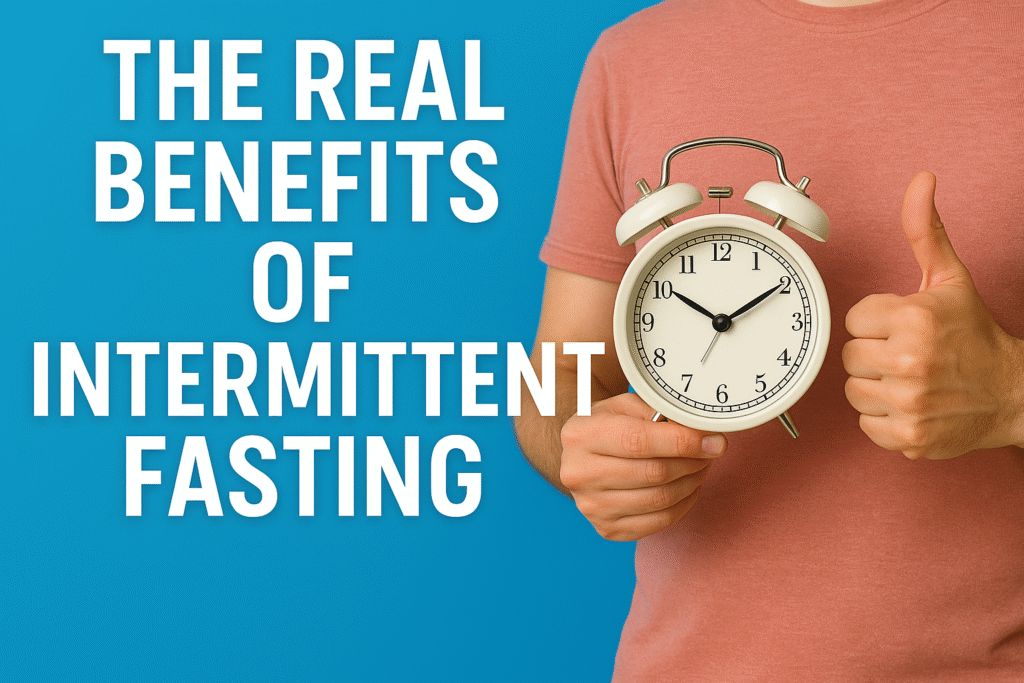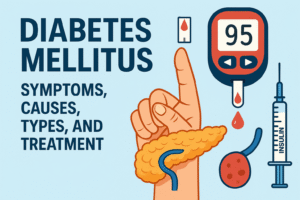The Real Benefits of Intermittent Fasting

In recent years, intermittent fasting (IF) has gone from a niche concept in health circles to a global wellness trend. And it’s not just a buzzword. Backed by both modern science and ancient wisdom, intermittent fasting is capturing attention for its potential to improve health in ways that extend beyond more weight loss.
But why has this approach gained so much traction? Unlike crash diets or extreme meal plans, intermittent fasting isn’t about restricting *what* you eat but *when* you eat. That shift in perspective makes a world of difference—not just for your waistline, but for your metabolism, brain, and even longevity.
In this post, we’ll explore the key benefits of intermittent fasting, grounding our discussion in both research and real-world insights.
What Is Intermittent Fasting?
At its core, intermittent fasting is an eating pattern that alternates between periods of eating and fasting. It’s not about specific foods or calorie counting. Instead, you follow a schedule—like eating during an 8-hour window and fasting for the other 16 hours of the day (a common approach known as 16:8).
Other methods include:
5:2 Diet: Eat normally for five days a week, restrict calories to 500–600 for the other two.
Eat-Stop-Eat: A full 24-hour fast once or twice a week.
Alternate-Day Fasting: Fast every other day, either completely or with a limited intake.
Though the patterns vary, the underlying principle remains the same: give your body time away from constant digestion so it can shift into repair mode.
1. Weight Loss Without Obsessive Dieting
Let’s start with the most obvious benefit—weight loss. Intermittent fasting creates a natural calorie deficit without the need for micromanaging every meal. When you eat within a restricted time frame, you’re less likely to overconsume calories.
More importantly, IF helps your body become more efficient at burning fat. During fasting periods, insulin levels drop. This drop signals the body to start using stored fat for energy instead of the glucose from your last meal. Over time, this can lead to noticeable fat loss, especially around the belly, which is linked to chronic disease risk.
What sets intermittent fasting apart is that it doesn’t require eliminating food groups or suffering through constant hunger. It’s sustainable, and many people find it surprisingly easy to stick with once their body adapts.
2. Improved Insulin Sensitivity
Type 2 diabetes and insulin resistance are among the most pressing health concerns today. IF can play a meaningful role in preventing or even reversing these conditions.
By giving your digestive system a break, fasting reduces insulin resistance, making it easier for your body to manage blood sugar levels. Several studies have shown that intermittent fasting can lower fasting blood sugar by 3–6% and fasting insulin levels by 20–31% in individuals with prediabetes.
Better insulin sensitivity doesn’t just help diabetics—it benefits anyone aiming for more stable energy, fewer cravings, and better metabolic function overall.
3. Supports Cellular Repair and Longevity
One of the more fascinating aspects of fasting is its impact at the cellular level. When you fast, your body initiates a process called autophagy—essentially cellular housekeeping.
During autophagy, your body clears out damaged cells and recycles waste material, which may help protect against diseases like cancer, Alzheimer’s, and heart disease. While more long-term studies in humans are needed, animal research consistently shows that intermittent fasting can extend lifespan and improve biomarkers associated with aging.
The logic is simple: if your body spends less time processing food and more time repairing itself, you’re likely to age more gracefully—both inside and out.
4. Enhances Brain Function and Mental Clarity
Surprisingly, going without food for a few hours can actually *improve* mental performance rather than hinder it. Evolutionarily, this makes sense. If our ancestors became mentally sluggish during times of hunger, they wouldn’t have survived long enough to find their next meal.
Intermittent fasting appears to support brain health in several ways:
Boosts brain-derived neurotrophic factor (BDNF): This protein supports learning and memory and may reduce the risk of depression and neurodegenerative diseases.
Reduces oxidative stress: Fasting may protect the brain from damage caused by free radicals.
Enhances focus: Many practitioners report sharper mental clarity and reduced brain fog during fasting windows.
In practical terms, this can mean improved productivity, better decision-making, and a clearer mind—benefits many people start noticing within a week or two of consistent fasting.
5. Reduced Inflammation
Chronic inflammation is a silent driver behind many modern illnesses, from joint pain to autoimmune conditions. Intermittent fasting may help reduce inflammation by lowering oxidative stress, improving gut health, and enhancing immune function.
One study published in *Cell* found that even short-term fasting could reduce pro-inflammatory markers in the blood. This aligns with the anecdotal experiences of many people who notice a reduction in bloating, skin breakouts, or body aches after adopting intermittent fasting.
6. Promotes a Healthier Relationship with Food
Ironically, fasting can make you *more* mindful about food. Rather than mindlessly snacking or eating out of boredom, you become more attuned to real hunger cues. Many people find that intermittent fasting helps reset their eating patterns and reduces emotional eating.
Once the initial adjustment period passes, it’s not uncommon to feel a greater sense of control and satisfaction around meals. Food becomes something to enjoy and nourish your body—not a constant source of anxiety or guilt.
7. Simplifies Your Day
One underrated benefit? Simplicity. With fewer meals to plan and prep, intermittent fasting can actually reduce decision fatigue and streamline your day. You save time on cooking, cleaning, and even grocery shopping.
For busy professionals, parents, or students, this mental relief can be significant. Some people also find that starting the day without food improves morning focus and eliminates the sluggishness that can follow a heavy breakfast.
Tips for Getting Started
If you’re new to intermittent fasting, here are a few gentle tips to make the transition smoother:
Start slow: Try 12-hour fasts first (e.g., 8 PM to 8 AM), then gradually extend the window.
Stay hydrated: Drink plenty of water, herbal teas, or black coffee to ease hunger.
Listen to your body: Fasting isn’t about punishment. If you feel weak or dizzy, eat something.
Avoid binge eating: Don’t overcompensate during eating windows—stick to balanced, nutrient-rich meals.
Who Should Avoid It?
Intermittent fasting isn’t for everyone. If you’re pregnant, underweight, have a history of eating disorders, or manage chronic health conditions, talk to a healthcare provider before starting.
Also, while intermittent fasting can be great for many, it’s not a silver bullet. It works best when combined with a healthy lifestyle—think whole foods, regular movement, quality sleep, and stress management.
Intermittent fasting isn’t a fad—it’s a return to a more natural rhythm of eating. While modern life pushes constant consumption, our biology often thrives with balance, rest, and the occasional pause.
Whether your goal is to lose weight, sharpen your mind, or simply feel better in your body, intermittent fasting offers a flexible, sustainable approach. No gimmicks, no forbidden foods—just a smart, time-tested way to work with your body instead of against it.
And perhaps that’s the biggest benefit of all: reconnection. To your hunger. Your habits. Your health.
Disclaimer: The content of this blog is for informational purposes only and does not constitute medical advice. Always consult with a healthcare professional before making major changes to your diet or lifestyle.
FAQs: Intermittent Fasting Benefits
1. Is intermittent fasting safe for everyone?
Not always. While many people can practice intermittent fasting safely, it’s not recommended for:
– Pregnant or breastfeeding women
– Individuals with a history of eating disorders
– People with diabetes or other metabolic disorders (without medical supervision)
– Those underweight or with certain chronic illnesses
Always consult a healthcare professional before starting.
2. Will I lose muscle while fasting?
Not if you’re doing it correctly. Intermittent fasting typically preserves muscle mass when paired with:
– Adequate protein intake
– Regular resistance training
In fact, many people find it easier to maintain lean muscle and lose fat with intermittent fasting than with traditional dieting.
3. Can I drink anything during the fasting window?
Yes, but only non-caloric drinks such as:
– Water
– Black coffee
– Plain tea
– Electrolyte water (unsweetened)
Avoid any drinks with sugar, milk, cream, or calories, as they can break the fast.
4. How long does it take to see results with intermittent fasting?
This varies. Some people notice reduced bloating and increased energy in just a few days. For fat loss or improved metabolic markers, it may take 2–4 weeks or more, depending on your body, lifestyle, and consistency.
5. Can I work out while fasting?
Yes, and many people do. Fasted workouts—especially in the morning—are popular for burning fat. However:
– Start with low to moderate intensity
– Stay hydrated
– Eat a nutritious meal post-workout
Listen to your body and adjust as needed.
6. Will intermittent fasting slow down my metabolism?
No—short-term fasting actually boosts metabolism slightly by increasing levels of norepinephrine (a fat-burning hormone). It’s prolonged, severe calorie restriction that may lower metabolism, not intermittent fasting.
7. What if I feel extremely hungry during fasting?
Hunger is normal at first and usually subsides after a week or two as your body adapts. Tips to manage hunger:
– Drink water or herbal tea
– Stay busy
– Get enough sleep
– Eat nutrient-dense meals during eating windows
If hunger is persistent and severe, it may be a sign that IF isn’t the right fit for you.
8. Can I still do intermittent fasting if I have a busy or irregular schedule?
Yes, IF is flexible. You can choose a method that fits your lifestyle—whether it’s 16:8, 5:2, or even one meal a day (OMAD). The key is consistency over time, not perfection every day.
9. Does intermittent fasting affect hormones?
Yes. IF influences hormones like insulin, human growth hormone (HGH), and even leptin (the hunger hormone). These changes can:
– Boost fat burning
– Improve insulin sensitivity
– Regulate appetite
However, women may be more sensitive to hormonal changes, so it’s important to start gradually and monitor how your body responds.
10. Is intermittent fasting a long-term solution?
It can be. Many people adopt intermittent fasting as a permanent lifestyle rather than a short-term diet. Its flexibility and focus on timing rather than restriction make it sustainable for many in the long run.






